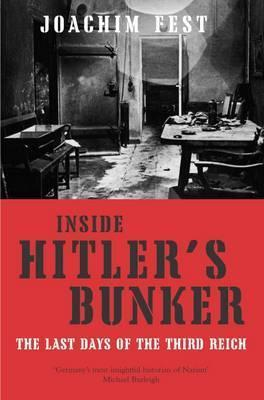Translated from the German by Margot Bettauer Dembo
London: Pan, 2005 (Originally published 2004) ISBN 0330431706
Is this the definitive book about the last few weeks at the heart of Nazi Germany? Perhaps so. Joachim Fest has gathered together information to present the chaotic and mad last days of Hitler's life, as Nazi Germany's final collapse happened above him as the Soviet Army subjected Berlin to its final torture and execution.
Fest has described day-by-day the last three weeks of Hitler's life, and ipso facto the life of the Third Reich, with all the insanity that was entailed in that, and has also posed some historical-philosophical questions on why it had to be that way.
The story of the final weeks in the Bunker is well-known, and Inside Hitler's Bunker adds to Hugh Trevor-Roper's classic The Last Days of Hitler with information that has come to light since the fall of the Iron Curtain.
Where this book is interesting is in Fest's thinking about why it had to end as it did. His theory is that the Fuhrer always had, if not a death wish, a desire to destroy. This desire led him, and by extension the Nazis, to always have an enemy to destroy, and when the enemies began to prevail, he moved his desires onto the German people, wishing them to be exterminated as they had proved themselves the "weaker" race.
Fest uses as evidence for his theories the fact that Hitler always sought out enemies to destroy, and when the Germans had taken over other countries he ensured that peace was never made with the populace - an example is the Ukraine, where the population was initially inclined to side with the Nazis, before their depredations turned the people against them.
The desire to crush his enemies became twisted into a desire for Germany to die in flames as they lost the War. Fest mentions that several times Hitler had the potential opportunity to come to terms with enemies during the War, but spurned them all. His infamous "Nero" order - which was in the main ignored - showed him to be completely without feeling for "his" people. In fact Fest shows that much of the last few weeks of Hitler's life was the story of him sacrificing everything for his own glory, initially in an effort to turn the War around, and when the final realisation of defeat had set in, in an effort to have the most Wagnerian of endings that he could.
These musings are worth considering, and while not explaining completely the insanity that was Hitler's reign, add to the picture of how such a disaster could come about.
If you want to know what happened in the bunker, this is probably the best book to read.
Recommended.
Cheers for now, from
A View Over the Bell
A View Over the Bell

No comments:
Post a Comment